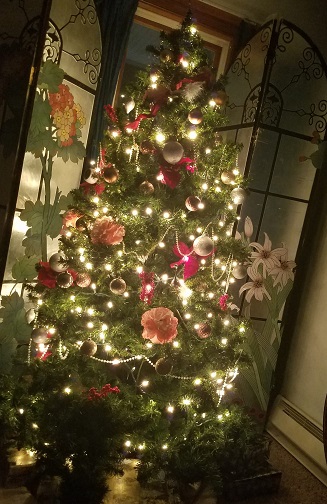My War on Christmas Commentary
I joyfully celebrate Christmas as a secular holiday. I love the spirit of it, and decorating the house, and making beautiful Christmas trees (we have multiple trees this year), and getting presents for everybody and wrapping them in colorful paper, and indulging in traditional holiday food like spiked eggnog and three different pies, and watching the same old Christmas movies, and having Christmas Day off of work and pretending that Santa came the night before and ate his cookies and left the presents. I thoroughly enjoy all these chintzy, goofy, American ways of celebrating Christmas, because that is how I have celebrated it since childhood. It is the tradition that has been passed down to me, and I uphold it for the same reason anyone upholds a tradition: it provides a sense of stability, an anchor to the past that relieves the uncertainty of the future.

I celebrate Christmas in this way, even though I am not a Christian, fully aware that originally Christmas comes from the Christian religion. I realize that “Christmas” essentially means “Christ’s Mass” and that it is part of an ancient liturgical tradition of celebratory days (“holy days” – i.e., “holidays”) and that it is the day that celebrates the birth of Jesus Christ. If it’s important to you to remember this about Christmas (“the reason for the season”), then by all means do so, as is your right in this land of religious freedom. But don’t expect me to care. I don’t think much of Christianity, which strikes me as a personality cult with an absurd theology. I say this as someone who believes in a spiritual dimension to reality, but doesn’t believe that Christianity quite gets it right. I especially don’t like the idea that you *have* to worship Jesus or you’ll go to Hell, which in my mind is the signature belief of Christianity.
So I celebrate Christmas, but as a secular holiday (if that phrase even makes sense), and I have accepted that this is what Christmas has morphed into in our time. Christmas has become a secular holiday and I’m OK with that, because I know that Christianity’s own traditions have morphed over the centuries. As you probably know, many of the customs of Christmas have pagan origins, such as Christmas trees, and the actual date itself, which is the same as the Roman festival of Saturnalia. Some current Christmas customs were added fairly recently in time (for example, Santa Claus), and in this globalized age Christmas has been appropriated by other cultures. I’m sure you’ve heard that in Japan, it is now a tradition to celebrate Christmas with food from Kentucky Fried Chicken restaurants.
If the Japanese can accept their weird, secular version of Christmas, then I can accept the weird, American version. Modern day American Christmas appropriates Christian elements, but in name only, and has become something non-Christian, and frankly that doesn’t bother me. I know this somehow bothers some people, and right-wing pundits claim there is a “war on Christmas,” but really all that these pundits are doing is stoking controversy in a politically-motivated culture war, and their complaints are absurd and pathetic. Nobody is stopping Christians from celebrating Christmas religiously, even though Christmas has transformed into a global, secular phenomenon.

What Christmas has become in our time is the season of maximum consumption so essential to the survival of America’s retail sector, when we all live our lives surrounded by cheesy holiday music and there are all these displays covering people’s houses and yards, some beautiful and impressive and others ridiculous and tacky, but all delightful. It has become part of a long stretch of time we call “the holiday season,” which culminates in New Year’s Day, and is a time of generosity and charity and reaffirming familial bonds; the modern version of the winter solstice celebrations that all society’s have, to see them through the darkest days of the year. We don’t face the same privations that preindustrial societies did in harsh winters, but we uphold the feasting tradition anyway, because having an annual period of gathering and sharing and respite from routine is how we cope as a species with the travail of our lives. Having an annual celebration of peace and goodwill towards others is how we affirm our deep potential for good and the value of our mysterious existence in the Universe, and that celebration can be called anything, it really doesn’t matter.
If you want Christmas to be more about Christian religious practice that’s your business, but don’t ask me to get involved.
And have a Merry Christmas!